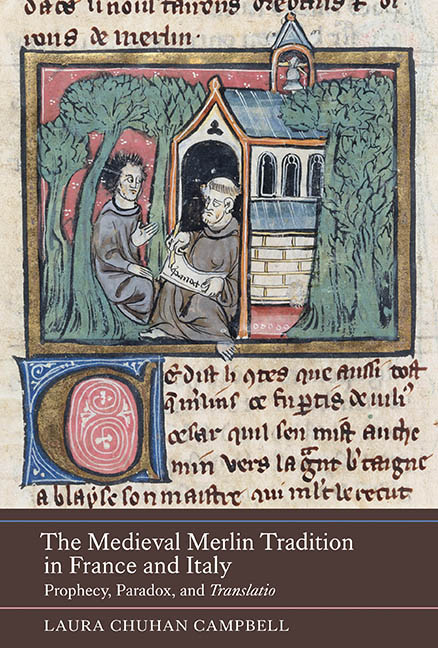Book contents
- Frontmatter
- Contents
- Miscellaneous Frontmatter
- Acknowledgements
- List of Abbreviations
- Introduction
- 1 Sympathy for a Devil? Merlin's Conception according to Robert de Boron and Paulino Pieri
- 2 Death of the Author: Merlin's Imprisonment by the Dame du Lac
- 3 Beyond the Limits of Interpretation: Rewriting Prophetic Discourse in the Estoire de Merlin and the Suite du Merlin
- 4 ‘Ce dit Merlin’: Open and Closed Prophecies in the Italian Merlin Tradition
- Conclusion
- Appendix 1 Chronology of Primary Texts
- Appendix 2 Summaries of the Principal Texts Discussed
- Bibliography
- Index
- Miscellaneous Endmatter
2 - Death of the Author: Merlin's Imprisonment by the Dame du Lac
Published online by Cambridge University Press: 23 August 2019
- Frontmatter
- Contents
- Miscellaneous Frontmatter
- Acknowledgements
- List of Abbreviations
- Introduction
- 1 Sympathy for a Devil? Merlin's Conception according to Robert de Boron and Paulino Pieri
- 2 Death of the Author: Merlin's Imprisonment by the Dame du Lac
- 3 Beyond the Limits of Interpretation: Rewriting Prophetic Discourse in the Estoire de Merlin and the Suite du Merlin
- 4 ‘Ce dit Merlin’: Open and Closed Prophecies in the Italian Merlin Tradition
- Conclusion
- Appendix 1 Chronology of Primary Texts
- Appendix 2 Summaries of the Principal Texts Discussed
- Bibliography
- Index
- Miscellaneous Endmatter
Summary
In his Livres dou Tresor, Brunetto Latini recites the canonical list of strong or wise men famously deceived by women. There is ‘David le prophete, ki por la beauté Bersabee fist meurtre et avoutire’ [David the prophet, who was driven by Bathsheba's beauty to commit murder and adultery], ‘Salemons, ses fils’ [Solomon, his son] who was induced by his wives to worship false idols, and Samson, who, due to a woman's betrayal, ‘perdi puis la force et la vertu et la vie’ [lost his strength, his virtue, and his life]. Within this survey of classical and Biblical victims of love, we find a familiar name:
De Troie, coment ele fu destruite, sevent uns et autres, et de maintes autres terres, et de hauz princes qui sont destruis por amer folement. Neis Aristotes, li tres saiges philosophes, et Merlins furent deceus par femes, selonc que les estoires nos racontent.
[People are aware of how Troy was destroyed, as were many other lands, and of the high princes who were ruined by falling in love unwisely. Even Aristotle, the very wise philosopher, and Merlin, were deceived by women, according to the stories.]
The list derives from classical rhetoric and Patristic writing, and was circulated throughout the Middle Ages in the form of exempla demonstrating the destructive power of sexual love. As the collection absorbed characters from popular stories and legends, Aristotle, Virgil, and Merlin were added to the repertoire. The story of Merlin's demise at the hands of the Dame du Lac is even more controversial than the story of his birth, but all French and Italian versions agree on a number of details: Merlin falls in love with the Dame du Lac, who is not a fairy or supernatural being, but a precociously clever lady. She promises Merlin her love in exchange for lessons in magic, and then uses that magic to confine Merlin to a cave, a tomb, or – in the Vulgate Cycle – a magic castle, causing him to withdraw from the main action of the narrative. After this, Merlin either becomes completely absent, or continues to prophesy from inside his tomb, but only to the chosen few who are able to find him.
- Type
- Chapter
- Information
- The Medieval Merlin Tradition in France and ItalyProphecy, Paradox, and Translatio, pp. 65 - 100Publisher: Boydell & BrewerPrint publication year: 2017

